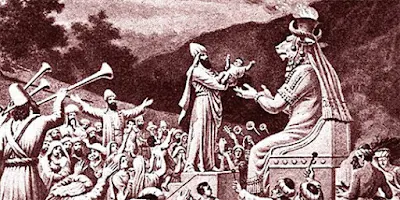EŞCİNSELLİĞİN ROMA DA YASAKLANMASI
Lex Sactinius
 |
| Eşcinsel Roma tanrıları |
 |
| Yahudilerin Ge-Hinnom vadisinde Molek'e bebek kurbanları Yahudilerce resmedilmiş bir olay. |
 |
| Yahudi ruhban kurban yakarken |
 |
| Ürdün Petra şehrinde, Yahudilerden en az 1500 yıl önce Sabilerin kurban yakma yeri. Yani cehennem çukuru |
 |
| Ge Hinnom yani CEHENNEM vadisinde Yahudilerin Kurban yakmalarını anlatan resim |
 |
| İşte, Yahudi Cehennem Çukurunun bu günkü hali. Ge Honnem Vadisi. Yunanlılar Gehenne (Cehenne) derlermiş. Bize de söyleyişi Yunanca'dan gelmiş olabilir mi Yoksa bizden mi onlara geçti bilmiyoruz |
 |
| Roma tanrıları kulamparalık ederken |
Bilim insanları arasında tartışmalar olsa da erken Roma cumhuriyet edebiyatı ve erken cumhuriyet, “iki erkeğin rızaya dayalı cinsel ilişkide karar kılmalarını sıklıkla kadınsılık olduğundan gülünç bulunduğunu ancak yasa dışı olmadığını" yazar. Sonradan Roma İmparatorluğu bu yasayı “kesinlikle yasak” olarak değiştirmiştir.
Şimdi, internetten derlediğim yazının çevirisindeki Roma hukuk maddelerine geçelim
Lex Scatinia
Lex Scatinia yanlışlıkla (Lex Scantia) da yazıldığı olan, M.Ö. 225’lerde, Marcus Cladıus Marcellus ile aynı cins ile cinsi münasebet ile suçlanıp mahkum edilmiş Aedile Scantinius Capitolinus’un adı verilerek bir kurulca hazırlanmış olan yasa M.Ö.149’da tanıtılmış, cinsel davranışları,fiilleri, kulamparalığı, zinayı, özgürlerde pasif eçcinselliği düzenleyen, “özgür doğan bireylere” ölüm cezası getiren Medeni Hukuk Yasasıdır.
Roma’da “Lex Scatinia” dan önce bir kanun olduğuna dair söylentiler varsa da kayıp olduğundan, bu kanunu yazan bir kayıt bulunamamıştır.
Lex Scatinia dahil bütün Roma Hukukları “özgür doğan vatandaşlar üzerinde etkili olan cinsel davranışları düzenliyordu.
Köleler “Res=şey” olarak adlandırıldığından karşı cinsle cinsellik, köleler arası eş cinsi münasebetlerde dahil ve yasadışı her işte kullanılabiliyor veya öldürülebiliyorlardı. Ancak cinsel ilişkide azdırıcı olarak kullanılmıyorlardı. Köleler için uygulanan cezalandırma genelde dövmek olarak uygulanmaktaydı.
 |
| Grek TEKE TANRISI Pan, bir erkeği becerimekte |
Ancient laws against homosexual acts
Greek laws existed which regulated pederasty, while later Romans laws went further in restricting it. Although there is some debate among scholars, Roman literature of the republic and early empire may indicate that men who engaged in consensual homosexual relations were often mocked as effeminate, but such was not illegal. Laws instituted in the later Roman Empire would change explicitly outlaw such.
On Dec 16, 342 A.D., Constantius and Constans issued a legal decision which was included in the later Theodosian Code:
Cod.Theod. IX. Viii. 3: (Cod. Justin IX.ix.31):
When a man marries in the manner of a woman, a woman about to renounce men (quum vir nubit in feminam viris porrecturam), what does he wish, when sex has lost all its significance; when the crime is one which it is not profitable to know; when Venus is changed to another form; when love is sought and not found? We order the statutes to arise, the laws to be armed with an avenging sword, that those infamous persons who are now, or who hereafter may be, guilty may be subjected to exquisite punishment.
The meaning of this is somewhat obscure, more explicit is the law issued by Valentinian II, Theodoisus and Arcadius on Aug 6, 390, and which also survives in the Theodosian Code:
Cod.Theod. IX. Vii. 6:
All persons who have the shameful custom of condemning a man's body, acting the part of a woman's to the sufferance of alien sex (for they appear not to be different from women), shall expiate a crime of this kind in avenging flames in the sight of the people.
During the Roman Imperial period the Lex Julia de adulteris (originally of c. 17 B.C.) was expanded by legal commentators to include first offenses against boys, and possibly all male homosexual acts. Under Justinian, the Eastern Roman Emperor from 527 A.D. to his death, historical accounts in Procopius and Malalas indicate that there was punishment of some homosexuals. In addition, under Justinian's legislative activity there was the strict Institutes of the Corpus Juris Civilis (effective Dec 30, 533), which is understood by some to sum up the legal opinons:[89]
Institutes IV. xviii .4:
In criminal cases public prosecutions take place under various statutes, including the Lex Julia de adulteris, "…which punishes with death (gladio), not only those who violate the marriages of others, but also those who dare to commit acts of vile lust with [other] men (qui cim masculis nefandum libidinem exercere audent)."
.
More significantly, two "Novels" by Justinian issued were directed against homosexual activity:
NOVEL 77 [358 AD] (extract)
http://en.academic.ru/dic.nsf/enwiki/9701306
…since certain men, seized by diabolical incitement practice among themselves the most disgraceful lusts, and act contrary to nature: we enjoin them to take to heart the fear of God and the judgment to come, and to abstain from suchlike diabolical and unlawful lusts, so that they may not be visited by the just wrath of God on account of these impious acts, with the result that cities perish with all their inhabitants. For we are taught by the Holy Scriptures that because of like impious conduct cities have indeed perish, together with all the men in them.[90]
NOVEL 141 [344 AD]
1. 1: For, instructed by the Holy Scriptures, we know that God brought a just judgment upon those who lived in Sodom, on account of this very madness of intercourse, so that to this very day that lands burns with inextinguishable fire. By this God teaches us, in order that by means of legislation we may avert such an untoward fate. Again, we know what the blessed Apostle says about such things, and what laws our state enacts. Wherefore it behoves all who desire to fear God to abstain from conduct so base and criminal that we do not find it committed even by brute beasts. Let those who have not taken part in such doings continue to refrain in the future. But as for those who have been consumed by this kind of disease, let them not only cease to sin in the future, but let them alos duly do penance, and fall down before God and renounce their plague [in confession] to the blessed Patriarch; let them understand the reason for this charge, and, as it is written, bring forth the fruits of repentance. So may God the merciful, in abundance of pity, deem us worthy of his blessing, that we may all give thanks to him for the salvation of the penitents, who we have now bidden [to submit themselves] in order that the magistrates too may follow up our action, [thus] reconciling to themselves God who is justly angry with us.
Late Roman pagan lawyers had already applied the Lex Julia to homosexual acts when Christian emperors enacted laws and issued exhortations against homosexuals, four in a two-hundred year period, with the two by Justinian (527-565) being as much concerned with penance as penalty.[91]
Under Roman Emperor Charles V, (A.D. 1539), Lex Carolina (Die peinliche Halsgerichtsordnung) was promulgated:
§116 Punishment of the Unchastity that occurs against Nature.
Moreover, if a human being commits unchastity with an animal, [or] a man with a man, [or] a woman with a woman, they have forfeited life, and, according to the common custom, they shall be banished from life unto death by fire.

